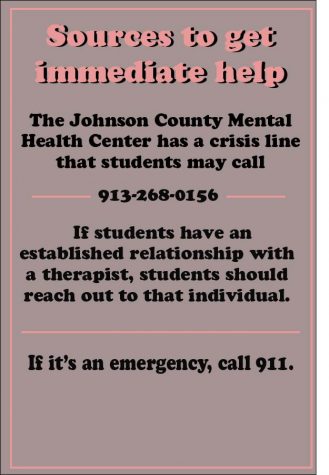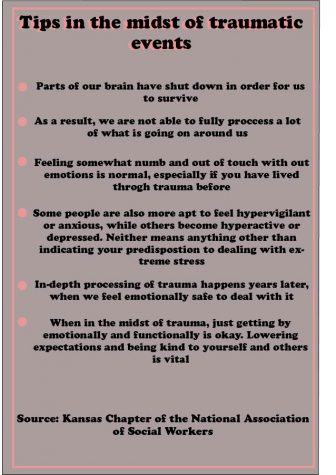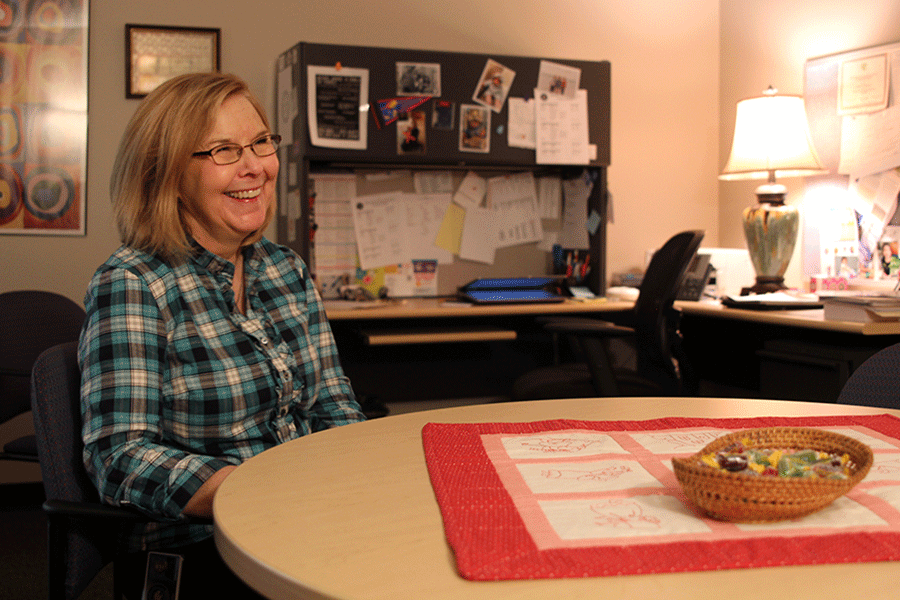Q&A with school social worker Debbie Gudenkauf
With students continuing to self-isolate uner quarantine, Gudenkauf offers some insightful tips on how to cope with mental health issues
By Jena Smith
School social worker Debbie Gudenkauf provides resources and tips for how students can deal with mental health issues during the stay-at-home order. (Photo originally taken Dec. 10, 2014.)
April 15, 2020
JagWire: What are some ways teenagers and adults alike can cope with anxiety than has arisen from the coronavirus?
School social worker Debbie Gudenkauf: Here are some great websites which focus on coping with anxiety during this time.
Yale University: https://www.rulerapproach.org/managing-anxiety-around-covid-19/
NAMI (National Alliance on Mental Illness): https://www.nami.org/Blogs/NAMI-Blog/March-2020/Coronavirus-Mental-Health-Coping-Strategies
National Child Traumatic Stress Network: https://www.nctsn.org/resources/parent-caregiver-guide-to-helping-families-cope-with-the-coronavirus-disease-2019
Child Mind Institute: https://www.nctsn.org/resources/parent-caregiver-guide-to-helping-families-cope-with-the-coronavirus-disease-2019

JW: What recommendations do you have for parents and students who have been diagnosed with depression and anxiety and be suffering more severely with these mental health disorders?
DG: Make sure you practice whatever strategies you’ve been taught. If you’ve not established what works for you, try some of the strategies listed in the resources included in the weblinks provided. If you are taking medication, make sure you continue to take it as prescribed. And always reach out to your therapist, counselor or the social worker. We are here for you and understand that this is a trying time for all.
JW: When it comes to seeking help online and or via the phone what are some resources that students can contact to get immediate help?
DG: The Johnson County Mental Health Center has a crisis line that students may call. That would likely be the quickest access to someone: 913.268.0156. Obviously, if they an established relationship with a therapist, I would encourage students to reach out to that individual. As always, if it’s an emergency, call 911.
JW: I know that counselors at schools across the district are available to talk to students via email; has the distinct set up any other hotlines or other resources for parents and students to connect with mental health professionals?
DG: Yes, students may continue to reach out to their counselors and/or the social worker. Many of us are already in touch with students. However, if a student would like to reach one of us, just send an email to the person you’d like to talk to. We can then set a time to talk via phone or zoom. Also, on the district website, there is a Family Resources website – https://www.usd232.org/Page/8264. This site has resources as well as links to the building social workers should the student or family need additional assistance. The social workers have an extensive list of resources within the community and/or on-line.
JW: When it comes to reading and watching the news, do you think parents of younger students should monitor what their children are viewing to reduce stress?
DG: Absolutely. Much of the literature about how to cope right now encourages even adults to limit their exposure. It’s a balance about knowing enough to keep yourself and your family safe while not obsessing over reading/watching everything to the point that it creates additional stress. Again… balance.
JW: Research shows that up to 25% of students struggle with clinical anxiety which can significantly impact a student’s ability to learn and perform up to their capacity. To students struggling with pre-existing mental health disorders such as anxiety, which may be worse during online schooling, what are some things parents and students can do to reduce their school-related anxiety?
DG: We all cope with stress/anxiety in different ways depending upon what we’ve learned and what we’ve encountered in the past. It’s important to not compare yourself with others. Coping, like grief, is individualized. It’s important to acknowledge how you are feeling and reach out when you want guidance. Use some of the strategies listed above, take care of yourself and be patient with yourself. Most of us do not have a blueprint on how to handle being quarantined. Try different strategies and again, take care of yourself and be patient with yourself and your loved ones.
JW: With more free time many students are spending more time playing video games, watching television and scrolling through social media applications. What recommendation do you have to students spending copious amounts of time online and do you think this could lead students to have mental health issues arise?
DG: This is tough – I think many people are falling into this because they can’t get out and socialize like they might do otherwise. I’ve encouraged students to make a wish list of sorts – what are some things you’d like to learn/do/accomplish. When you get bored or antsy, go to your list, pick something and do it.
Is there a skill you’ve wanted to learn? There are lots of YouTube videos to help teach you. Think about playing a ukulele, learn a needlecraft, garden, learn to cook, mow yards for neighbors, go fishing, practice sports moves/shots, etc. We are fortunate that Amazon can supply us with many of the materials we might need.

Does your closet need to be cleaned out? Now is a great time to do that and donate what you no longer need.
Is there a book you’ve heard about and would like to read? Reading can be a wonderful escape.
Is there a trip your family would like to take someday? Start planning…how will you get there, where will you stay, what will you do?
Go through old photos and jot down favorite memories in a journal – you will enjoy looking at those later.
Make a COVID-19 journal – how did you feel, what did you do to pass the time?
Go for sensory walks – what do you see, smell, hear, feel. These are great for exercise as well as grounding. The Vitamin D we get from the sun is very beneficial and will improve moods.
Have an intention you set each day – what is something you can look forward to? Try to establish a “purpose” for each day as well as something you are looking forward to.
JW: Many students have stated that they don’t have a great sleep schedule and many studies suggest that not getting enough sleep can hurt one’s mental health. What recommendations do you have to students when it comes to getting an adequate amount of sleep and keeping a schedule?
DG: It’s always important to establish routines and do your best to maintain them. During this time of uncertainty, the more you can establish a routine (even if it’s much different than before), the better you’ll be able to cope. This is important for adults as well. While you don’t want to be rigid, try to get up about the same time, establish a morning routine including eating a healthy breakfast, doing schoolwork, chores, etc. Have a break about lunchtime then have a plan for your afternoon. Also try to establish a bedtime routine, including limiting screen time for 1-2 hours before bed. This “routine” will tell your body that it’s time for bed. Do not do schoolwork in your bed! Having your bed just be where you relax and sleep will help your body know it’s time for sleep.










